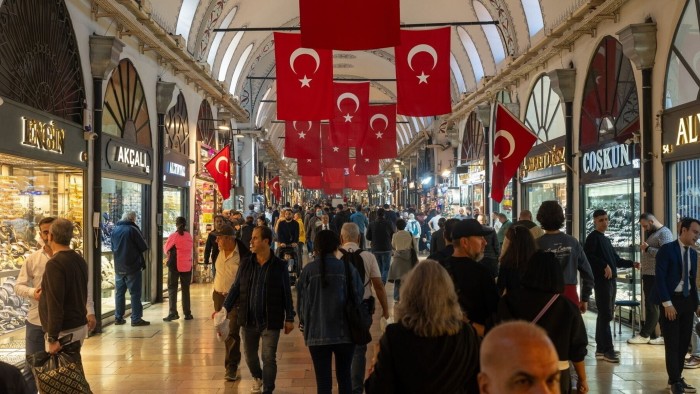Unlock the Editor’s Digest for free
Roula Khalaf, Editor of the FT, selects her favourite stories in this weekly newsletter.
Turkey’s central bank cut its key interest rate by one percentage point to 39.5 per cent, slowing the pace of easing amid heightened political risks and what the bank called “evident” risks in its fight to curb rising prices.
The decision on Thursday reflected a delicate balancing act between calls by Turkish businesses for rate cuts, and the need to bear down on inflation which rose unexpectedly to 33.3 per cent in September. The reduction, which matched market expectations, represents a lesser pace than the 250 and 300 basis point cuts at the two previous meetings.
Adding to the risks that the bank had to juggle is a legal case on Friday against the country’s main opposition party that highlights growing concerns about Turkish democracy, and which analysts said could significantly affect market sentiment.
The court hearing against the opposition Republican People’s Party (CHP), could determine whether Özgür Özel remains its leader — or if he will be forced out and a government appointee put in charge instead.
“While recent data suggest that demand conditions remain disinflationary, the disinflation process is slowing,” the central bank said in a statement. It added: “The risks posed to the disinflation process . . . have become evident.”
The Turkish lira traded broadly unchanged after the decision, at 41.98 to the US dollar. The stock market’s benchmark BIST 100 index edged up 0.8 per cent.
Turkey is more than two years into a stabilisation programme aiming to stop runaway inflation largely brought about by the ultra-low interest rate growth policies previously favoured by President Recep Tayyip Erdoğan.
Rebuilding foreign reserves and bringing down inflation that peaked at 75 per cent last May are two of the main priorities of finance minister Mehmet Simsek and central bank governor Fatih Karahan.
Turkey has suffered several bouts of market turmoil linked to various CHP cases this year, including in March when the arrest of Istanbul mayor and putative presidential candidate Ekrem İmamoğlu on corruption charges sparked a financial panic.
In Friday’s case, prosecutors allege that Özel came to power in a party congress marred by irregularities, including vote buying, and want him replaced by a trustee.
“Political tensions are threatening to reverse some of the gains in macro stability,” Alexander Perjessy, vice-president at Moody’s Investors Service, said at a conference on Islamic finance in Istanbul on Thursday.
“Political noise . . . has a track record in Turkey of undermining investor sentiment. That tends to depress the lira and complicate monetary policy,” he said in comments reported by Bloomberg.
Surging gold prices have helped propel gross foreign reserves to a record $198bn, providing a bulwark against currency instability. However, sticky inflation and strong domestic demand have confounded the fight against inflation.
“The central bank statement implied it shouldn’t cut rates — but it did,” Hakan Kara, former chief economist of Turkey’s central bank, said. “God help them; what can I say,” he added in a social media post.

